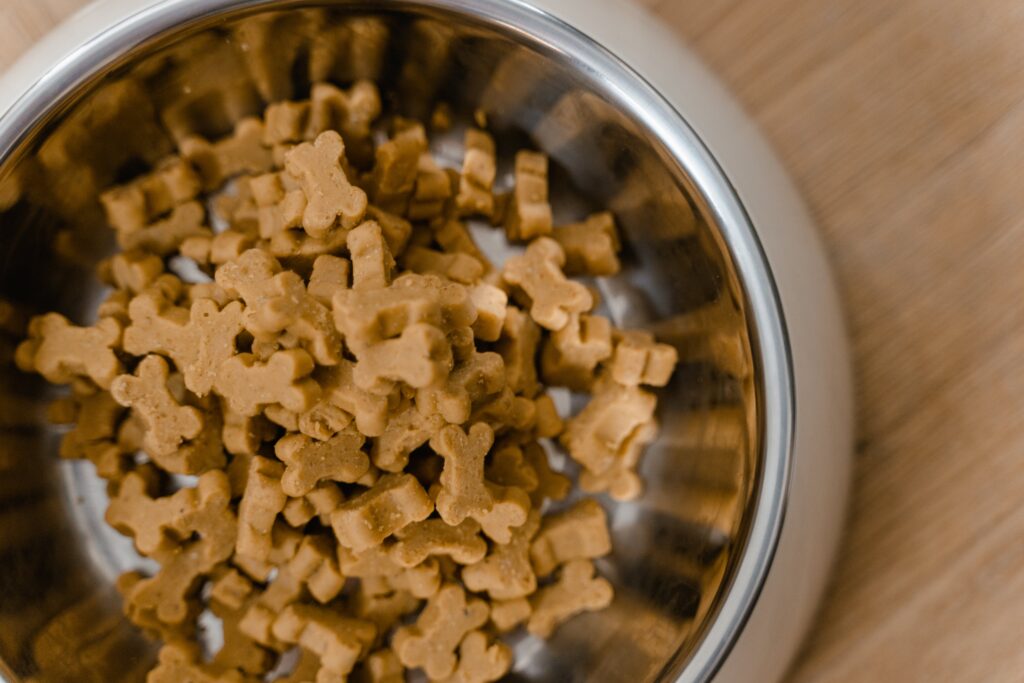
Dog Nutrition 101: Building a Healthy Foundation for Your Pet
Nutrition is a crucial aspect of your dogs overall health.
As the saying goes:
The food you eat can be either the safest and most powerful form of medicine or the slowest form of poison.
This is equally true when it comes to our dogs. The right diet supports a robust immune system, a shiny coat, balanced energy levels, and a healthy weight.
In this guide, we’ll provide a holistic overview of dog nutrition. We’ll start with the basics—essential nutrients and hydration. Then, we’ll talk about selecting the right commercial dog food, which forms the backbone of most canine diets.
Beyond the main meals, we’ll explore the often overlooked use of dog treats and the incorporation of supplements to address specific health concerns.
Whether you’re new to dog ownership or seeking to update your knowledge, this guide provides the essentials for making informed dietary choices for your dog.
Dog Nutrition 101: Building a Healthy Foundation for Your Pet
Understanding Dog Food & Nutrition Basics:

Ensuring your dog receives the right nutrition is one of the most important responsibilities you have as a pet owner.
A well-balanced diet is key to keeping your dog healthy, active, and happy throughout their life.
Hydration: The Unsung Hero
Before we get too deep into anything else, lets firstly discuss water. It is an often-overlooked but essential component of your dog’s diet and nutrition.
It aids in digestion, helps regulate body temperature, and is vital for almost every bodily function. Without proper hydration, your dogs body would struggle to make effective use of any nutrients you feed them.
The amount of water a dog needs can vary based on a number of factors including; size, diet and age. However here are some guidelines to get you started:
- Generally, dogs need about 500ml (a full water bottle!) of water per 10kg of body weight per day.
- During and after exercise dogs may need much more.
- Dogs in hot climates or on hot days may need much more.
Ensuring your dog is hydrated is one of the most important things you can do for your dogs health.
To ensure adequate hydration make sure your dog has access to fresh, clean water at all times.
Essential Nutrients
With adequate water, your dog will be able to make use of the nutrients you feed them. Just like humans, dogs need a mix of proteins, carbohydrates, fats, vitamins, and minerals to maintain their health.
- Proteins: The building blocks of your dog’s body, proteins support healthy growth, repair tissues, and maintain a strong immune system.
- Fats: Essential for energy and the absorption of certain vitamins, fats also contribute to a healthy coat and skin.
- Carbohydrates: Play a crucial role in providing energy and supporting digestive health, aiding in the smooth functioning of your dog’s metabolism.
- Vitamins and Minerals: These are crucial for a range of bodily functions, from bone health to nerve function.
Understanding and providing these essential nutrients in the right balance is the cornerstone of your dog’s health and well-being.
Each nutrient plays a unique role in supporting various bodily functions, with the majority—over 90%—of your dog’s required nutrients ideally coming from their main food.
The Case for Commercial Dog Foods
Finding the ideal mix of nutrients for your dog is a daunting task, requiring expert knowledge and a significant investment of time and effort.
For this reason, and for the sheer convenience it offers, we strongly advocate for the use of commercial dog foods.
These foods remove the complexity and uncertainty from feeding your dog, ensuring they receive a balanced diet with minimal fuss.
Commercial dog foods are crafted by nutritionists to provide the exact balance of proteins, fats, carbohydrates, vitamins, and minerals your dog needs. With careful research, reputable brands tailor diets to fit dogs of all ages, sizes, and lifestyles, ensuring high-quality nutrition.
Choosing a commercial dog food means you’re ensuring your pet receives a well-rounded diet that supports their overall well-being.
Selecting the Right Commercial Dog Food

Selecting the appropriate dog food is a pivotal step in fulfilling your dog’s nutritional needs. Since the majority of your dog’s diet will come from their main food, it’s essential to choose a product that provides a comprehensive blend of the nutrients we’ve discussed.
However, with the vast array of dog food options available, making this choice can sometimes feel overwhelming.
Reading Labels: Your Guide to Understanding Dog Food
One of the most effective tools at your disposal is the ability to read and understand pet food labels.
Labels provide vital information about the ingredients, nutritional content, and the proportion of key components.
Ingredients are listed in descending order by weight. High-quality dog foods often have a specific type of meat (e.g., chicken, lamb, beef) as the first ingredient, indicating that it is the main ingredient.
Tips for Reading Dog Food Labels:
Prioritize Whole Ingredients: Foods listing whole ingredients like specific meats at the top are generally higher in quality. This indicates a more nutritious and digestible source of protein for your pet.
Avoid Ambiguous Ingredients: When scrutinizing dog food labels, be wary of vague of ambiguous ingredient descriptions like “meat by-products” or “animal derivatives.”
Understanding ‘Ash’: The term ‘ash’ on pet food labels refers to the total mineral content of the food, obtained by burning the product during testing. While it might sound odd, ash is a standard measure of the food’s mineral composition, including essential nutrients like calcium and phosphorus.
Complete vs. Complementary: Dog foods must be labelled as either ‘complete’ or ‘complementary.’ A ‘complete’ food provides all the nutrients your dog needs in the right balance, making it suitable as a standalone diet. ‘Complementary’ foods, on the other hand, should be fed alongside other foods to ensure a fully balanced diet, as they do not contain the full spectrum of necessary nutrients by themselves.
Understanding the Options
Despite the advantages of commercial dog foods, the sheer number of options can be overwhelming.
Each brand promises the best for your dog, with formulations ranging from life-stage and breed-specific diets to grain-free and high-protein options.
In Dog Food Decoded: Your Complete Guide we deep dive into all the factors that you should consider when looking for your dogs day to day food to help you make an informed decision.
Additionally, our Dog Food Finder tool is an invaluable resource for getting personalised food recommendations. Just answer a few easy questions, and we use everything we know from our “Dog Food Decoded” guide to suggest foods that fit your dogs needs.
Dog Treats

Whether it’s a reward for good behaviour, a tool to aid in training, or simply a way to show love, treats are an inevitable part of your dog’s daily routine.
Given their significance, it’s vital to consider how these fit into the broader picture of your dog’s nutrition.
While treats should primarily be just that—a simple pleasure for your dog—selecting them carefully can also allow them to serve a secondary purpose.
This means alongside the usual treats, there’s room for specialised options that cater to everything from dental health to mental stimulation, ensuring a well-rounded approach to your pet’s overall nutrition, health and well-being.
Selecting the Right Treats:
There are numerous types of treat options available. Some that have associated health and well being benefits, and some that are just tasty rewards:
- Crunchy Treats and Biscuits: Great for everyday rewards and dental health, as their hard texture helps reduce plaque build-up.
- Soft Treats: Ideal for training due to their appealing taste and texture; easy to break into smaller pieces without crumbling.
- Chew Treats: Great for keeping dogs occupied and satisfying their chewing instinct.
- Low Calorie Treats: Small, low-calorie treats ideal for repetitive use during training sessions.
- Functional Treats: Enriched with supplements to support specific health concerns, such as joint health, skin and coat improvement, or digestive health.
The choice of treats should be based on your dog’s individual needs, preferences, and health conditions. For instance, overweight dogs might benefit from low-calorie treats, while active dogs could have more energy-dense options.
For a deep dive into treat options, have a look at our Dog Treats Guide.
The Importance of Moderation
The key to using dog treats effectively is moderation. As a general rule, treats should not make up more than 10% of your dog’s daily calorie intake.
This helps ensure that the bulk of their nutrition comes from their balanced main food, keeping treats as a beneficial addition rather than a dietary staple.
Dog Supplements

While a complete and balanced diet is the cornerstone of good canine health, there are situations where supplements can play a vital role. Supplements are designed to provide targeted nutritional support, addressing specific health needs or conditions that a regular diet might not fully cover. Here are a few of the most commonly used supplements for dogs.
Joint Supplements for Dogs
Glucosamine and chondroitin sulphate are vital components of cartilage and joint fluid. Supplementing with these can be used for:
(osteo)Arthritis Relief: They help rebuild cartilage and restore joint fluid, offering relief from osteoarthritis symptoms.
Preventive Care: Regular supplementation can be beneficial in breeds prone to joint issues, potentially delaying the onset of joint problems.
Improved Mobility: These supplements can enhance the overall mobility and comfort of dogs, especially those who are aging.
Omega-3 Fatty Acids for Dogs
Omega-3 fatty acids, particularly EPA and DHA, are known for their anti-inflammatory properties:
Skin and Coat: They promote a healthier, shinier coat and can improve skin conditions.
Joint Inflammation: Omega-3s can reduce inflammation in joints, aiding dogs with arthritis.
Heart and Brain Health: Beneficial for cardiovascular health and cognitive function, especially in older dogs.
Probiotics for Dogs
Probiotics are beneficial bacteria that aid in maintaining a healthy balance in the dog’s gut flora:
Digestive Health: They can help regulate bowel movements, aiding in both diarrhoea and constipation, and improve overall digestive function.
Immune System Support: A significant portion of the immune system is housed in the gut; thus, a healthy gut flora is essential for a robust immune response.
Mood and Behaviour: Emerging research suggests that a healthy gut can positively affect mood and behaviour.
The selection of a supplement should be based on the dog’s specific needs, age, breed, and any existing health conditions. Supplements also pose risks if misused. Over-supplementation can lead to health issues, and some supplements might interact with medications.
For more information on supplements have a look at our supplements guide.
Navigating the World of Dog Food & Nutrition

In the journey of pet ownership, understanding and implementing the right nutrition for your dog is both a responsibility and a form of care.
From the foundational meals that form the backbone of their diet to the treats that reward and delight, each choice you make plays a crucial role in their health and happiness.
Our comprehensive guide has traversed the essentials of dog nutrition, from the critical nutrients required to maintain optimal health to the landscape of treats and supplements.
Through this exploration, we’ve emphasized that while the core of your dog’s nutrition will come from their daily meals, treats and supplements have a valuable place in their diet, contributing not just to their physical health but to their mental and emotional well-being as well.
Thank you for joining us on this journey through the world of dog nutrition. Here’s to many happy, healthy years ahead with your four-legged friend, filled with wagging tails, bright eyes, and contented barks at meal times.
Always remember, while this guide offers a wealth of information, the advice of a veterinarian is irreplaceable when it comes to your dog’s specific dietary needs.


